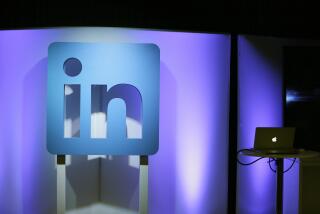Internet May Offer Right Medicine for Behavior-Related Health Issues
- Share via
The very successes we are having in medical care will soon confront us with some tough questions.
One is familiar, if not easy: How should we allocate scarce resources? Who gets the fresh kidney? How much is a life worth? Is it right to spend $300,000 saving the life of a rich, elderly widow in a hospital--in a world where children are dying every day for the lack of $2 worth of medicine or clean water?
Is there a relationship: Would abandoning the widow help fix the problems that lead to poisonous water in Africa?
One convenient feature of the real world is that we don’t need to address these problems together. We can tend to the rich widow while someone else worries about the starving kids in Africa.
The Internet, however, is different. Its breadth and omnipresence don’t let us ignore contradictions so neatly. Its explicitness and freedom from friction let tough dilemmas poke us in the eye.
While medicine itself has progressed remarkably, the Internet offers further benefits beyond the obvious ones of more efficiency, better record-keeping and better information distribution. As in other fields, it empowers the user--it will help in disease prevention as well as in care and cure.
Consider this: In addition to improved medicines, we now have better information about what causes our health problems and what we can do to prevent them. We also (in developed countries) have access to more wholesome foods, safer cars and appliances, and better working conditions.
Yet people around the world seem less and less healthy. In the United States there’s an epidemic of obesity, even among the young. In Russia, people die of drinking and the stupid things they do while drinking. In parts of Africa, the AIDS epidemic is spreading.
Much of this has been due to people’s own behavior. But the Internet now offers us tools to monitor our actions, to learn about good practices (everything from daily flossing to safe sex to avoiding environmental hazards) and to get reinforcements and reminders to follow them.
*
More than just a passive medium for dissemination of medical information (and medical misinformation too, unfortunately) the Net can be an active force enabling individuals to take control of their own health.
What I’m talking about is not esoteric medical advice, but simple behavior modification--the things you can read in a Time magazine special report or a Jane Brody health column in the New York Times.
The facts are simple: People need more sleep, less alcohol and tobacco, more preventive tests, better diets. The Net is a perfect medium for people to set up their own health-management plans. They can benefit from the Net’s capabilities to customize and personalize, with programs tailored for their height and weight, taking into account their exercise program (or lack thereof). It can also factor in existing medical conditions and predispositions based on family history, to the extent the user informs the system.
You can have a mileage account with Delta Airlines, why not a calorie account with Myhealth.nu? (Myhealth.com already exists, so I made up a new one.) It’s easy enough to build applications that would give people useful, specific advice. “Since it’s raining in Portland today, why not stay indoors and work out on your exercise machine?” Or, “Did you remember to take your pills at lunch today?”
Or, “Now that you’re heading for your 39th birthday, it’s time for a colonoscopy. When you schedule it, please let us know by entering the date. Until you do, how often would you like to receive this reminder?”
Of course, this all smacks of mind control/brainwashing, except that a person selects it for himself. It’s the equivalent of joining a health club that will prod you into exercising.
But none of this will work if people are not confident that their information is private and secure. Do you really want to report what you ate for dinner last night? How many beers you had over the weekend? Do you dare to be honest about the drugs you took or the unprotected sex you had?
The medical community must move to ensure consumers of their privacy so that they’re willing to take advantage of what technology offers them--the ability to help themselves. And it needs to restrain itself from going further: offering help where it is not wanted, collecting private information so it could “help” more.
The primary health benefits come from the patient and the information; the software doesn’t care what your real name is. If you won’t tell your doctor the truth, maybe you’d prefer to take a scolding from a machine.
The tougher problem comes later: Suppose you eventually have to sign up for such a program to get health coverage or medical insurance. And suppose the information is used to charge you for your unhealthy behavior or to punish you for it.
What happens when life insurance companies ask you to sign up for such a program to get lower rates? For which of your actions are you responsible?
*
It’s going to be harder to pretend we know less than we do when it comes to insurance costs. It’s now possible to know about people’s behavior and about their genes in a way that was not possible before. It’s possible to let people use tools to control their own behavior--and it’s possible to abuse the information they generate in doing so.
We need to make the responsible, grown-up decision and respect individuals’ control over their own lives--data and behavior. We also need to make transparent, responsible judgments about the line between encouraging people to behave responsibly--and brainwashing them.
Of course we could have a more perfect world if we controlled everyone’s behavior. But then, we could have a completely perfect world if we had no people at all, because then there would be no misbehavior.
These are social policy questions that go well beyond the Internet, but the Internet will make us face them.
*
Esther Dyson edits the technology newsletter Release 1.0 and is the author of the bestseller “Release 2.0.” She is also chairwoman of the Internet Corp. for Assigned Names and Numbers. Send comments to edyson@edventure.com.






